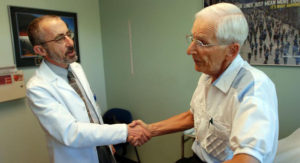
Talking with your doctor
A basic plan can help you make the most of your appointment whether you are starting with a new doctor or continuing with the doctor you’ve seen for years. The following tips will make it easier for you and your doctor to cover everything you need to talk about.
Make a list of what you want to discuss. For example, do you have a new symptom you want to ask the doctor about? Do you want to get a flu shot? Are you concerned about how a treatment is affecting your daily life? If you have more than a few items to discuss, put them in order and ask about the most important ones first. Don’t put off the things that are really on your mind until the end of your appointment—bring them up right away!
Sometimes it is helpful to bring a family member or close friend with you. Let your family member or friend know in advance what you want from your visit. Your companion can remind you what you planned to discuss with the doctor if you forget. She or he can take notes for you and can help you remember what the doctor said.
Share your medical history. Tell the doctor about your illnesses, operations, medical conditions, and other doctors you see. You may want to ask the doctor to send you a copy of the medical history form before your visit so you can fill it out at home, where you have the time and information you need to complete it. If you have problems understanding how to fill out any of the forms, ask for help. Some community organizations provide this kind of help.
Share former doctors’ names. Give the new doctor all of your former doctors’ names and addresses, especially if they are in a different city. This is to help your new doctor get copies of your medical records. Your doctor will ask you to sign a medical release form giving him or her permission to request your records.
Many older people use glasses or need aids for hearing. Remember to take your eyeglasses to the doctor’s visit. If you have a hearing aid, make sure that it is working well and wear it. Let the doctor and staff know if you have a hard time seeing or hearing. For example, you may want to say: “My hearing makes it hard to understand everything you’re saying. It helps a lot when you speak slowly.”
Let your doctor know what has happened in your life since your last visit. If you have been treated in the emergency room or by a specialist, tell the doctor right away. Mention any changes you have noticed in your appetite, weight, sleep, or energy level. Also tell the doctor about any recent changes in any medications you take or the effects they have had on you. Discussing Changes in Your Health: Worksheet and Tracking Your Medications: Worksheet can help you get organized.
For More Information About Getting Ready to Visit the Doctor
Centers for Medicare & Medicaid Services
1-800-633-4227 (toll-free)
1-877-486-2048 (TTY/toll-free)
www.medicare.gov
